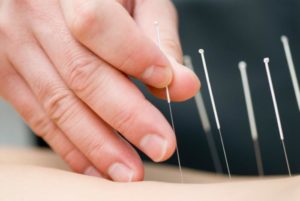 The study, from Wake Forest Baptist Medical Center in Winston-Salem, NC, is published in the journal Menopause.
The study, from Wake Forest Baptist Medical Center in Winston-Salem, NC, is published in the journal Menopause.
Lead author Nancy Avis, professor of public health sciences, says:
“Although acupuncture does not work for every woman, our study showed that, on average, acupuncture effectively reduced the frequency of hot flashes and results were maintained for 6 months after the treatments stopped.”
Acupuncture is a traditional Chinese medicine technique where a practitioner stimulates specific points on the body – usually by inserting thin needles through the skin.
Some studies have suggested acupuncture may help ease some types of chronic pain.
Relatively few complications from using acupuncture have been reported. Still, they can arise from use of non-sterile needles and improper delivery of treatments.
Menopause is when a woman’s menstrual periods stop and she is no longer able to conceive naturally. The periods can diminish gradually, or they can stop suddenly.
As a result of the hormonal changes that occur during menopause, many women experience symptoms such as hot flashes – sudden feelings of heat in the upper part or all of the body. When they occur at night, hot flashes (also known as hot flushes) are called night sweats.
In the United States, the average age when women have their last period is 51 years. However, some women have their last period in their forties, and some have it later, in their fifties.
Reduction in hot flashes persisted for 6 months
For their study, Prof. Avis and colleagues recruited 209 women aged 45-60 who had not had a period for at least 3 months and who were having, on average, at least four hot flashes or night sweats per 24-hour period in the previous 2 weeks.
Fast facts about acupuncture
The effects of acupuncture on the brain and body and how best to measure them are only beginning to be understood
Evidence suggests acupuncture may ease low-back pain, neck pain, osteoarthritis/knee pain
It also may help reduce tension headaches and prevent migraine.
Learn more about acupuncture
The participants were randomly assigned to one of two groups. One group (the treatment group) received acupuncture treatment for the first 6 months and was followed for a further 6 months. The other group (the comparison group) did not receive acupuncture in the first 6 months, but received it in the second 6 months.
Each participant was allowed up to 20 treatments within their 6-month slot. These were given by licensed, experienced practitioners in the community.
All participants recorded frequency and severity of any hot flashes and night sweats in a daily diary. Every 2 months, they also completed quality of life questionnaires that included questions on how their hot flashes interfered with daily life, symptoms of depression or anxiety, quality of sleep, and any other physical symptoms.
Prof. Avis says they left decisions about frequency and number of treatments to the participants and their acupuncturists, so the study could be as close to the “real world” as possible.
After the first 6 months, the treatment group reported 36.7 percent fewer hot flashes per day, compared with before they started treatment. In contrast, the comparison group reported an increase of 6 percent.
After a year, the treatment group reported having 29.4 percent fewer hot flashes than before treatment, suggesting the benefits persisted for 6 months after treatment ceased.
After they received their treatment in the second 6 months, the comparison group reported a similar reduction – 31 percent – in hot flashes as that reported by the treatment group following their 6 months of treatment.
The authors note that the treatment group also showed persistent improvements in many of the quality of life measures relative to the comparison group.
“There are a number of non-hormonal options for treating hot flashes and night sweats that are available to women.
None of these options seem to work for everyone, but our study showed that acupuncture from a licensed acupuncturist can help some women without any side effects. Our study also showed that the maximum benefit occurred after about eight treatments.”
Prof. Nancy Avis
However, the study was not designed to prove that the reduction in symptoms was due to the treatment. Prof. Avis says the effects shown in the study could have resulted from less specific factors, such as the extra care and attention that the participants received during treatment, or their expectations about the treatment.
She suggests future studies should try to identify individual differences in response to acupuncture.
MNT DT






